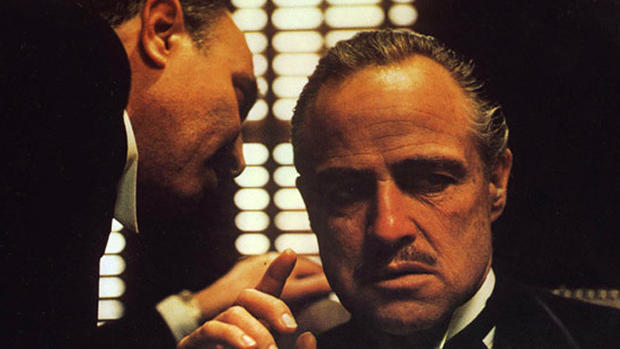
Al Pacino on becoming Al Pacino
On a bright day overlooking Beverly Hills, Al Pacino recalls a warning from years ago, from his therapist: “He said, ‘Don’t go to L.A., Al!'”
But here is, and even now, at 84, he’s still adjusting to that Hollywood life.
“You have to learn how famous you are,” he said.
“The Godfather”: The 50th anniversary 53 photos
He got the part, but studio execs pushed to fire him. We watched a scene that Pacino thought, even hoped, would be his last on the film – Michael’s escape from Louis’ Restaurant after fatally shooting Sollozzo and Captain McCluskey. Running outside, he jumps onto the getaway car but misses and falls.
Pacino believed he’d busted his ankle. His thought? “Thank you, God. I’m gonna get out of this film!”
That’s right: Al Pacino was relieved. He thought he was so badly injured, he could get out of “The Godfather.” Thankfully, his ankle healed, and the kid stayed in the picture.
A string of hits followed, including “Serpico” and “Dog Day Afternoon,” where an ad lib became a classic cinematic moment:
“This great AD, assistant director, comes running up to me as I’m about to go out and says, ‘Say Attica.’ I said, ‘What?’ He said, ‘Say Attica. Say Attica.’ And the crowd just went into spasm and they all – they knew it. They were right in it.”
All the attention, all the success didn’t sit well with Pacino. He coped by drinking. “Alcohol is a depressant – like, literally it brings you down,” he said.
Mankiewicz asked, “And how’d your life change when you stopped?”
“Well, it got a little worse for a while,” Pacino laughed. “It really was terrible. But then, eventually, thank God, it got there.”
In his memoir, he’s candid about his struggles with alcoholism. He also reveals that he nearly died from COVID. “Out of this world,” he said. “I mean, I was here and then I wasn’t. The nurse said my pulse stopped. Now, I don’t think my pulse stopped.”
“But it doesn’t really matter whether technically you were close to death or not. You felt it,” said Mankiewicz.
“I did. I really did,” Pacino said. “It was so real. And I didn’t see any light. I didn’t see anything at all. There’s a speech in ‘Hamlet’ where he says, ‘To be or not to be.’ You know? And then when he talks about leaving the Earth when you die, and he says, ‘No more. No more.’ How about that?”
These days, there’s plenty more for Al Pacino. He’s as busy as ever. “I like sitting on the couch. But I keep working,” he said. “I’ve got six films. Smaller roles, of course. And they haven’t come out yet.”
And, despite that advice from his therapist, he’s living in L.A. But he is not, he assures us, an “L.A. guy.”
“No. I don’t think so,” he laughed. “I still speak English. In L.A., they speak Hollywood!”
Truth is, this is where they make movies. A fitting place for a guy who remains what he’s always been: an actor, still experiencing the same buzz he felt 60 years ago on an Off-Broadway stage in New York, which he described as a recognition that “I’m never gonna do anything else but this. I have found it. I don’t care what happens to me, whether I succeed, not succeed, didn’t matter. I had this.”
Mankiewicz said, “You write that, like, ‘Maybe I’ll be able to eat or I won’t eat. Maybe I’ll have money or I won’t have money. Maybe I’ll become famous. Maybe I won’t. Doesn’t matter.'”
“Didn’t matter,” said Pacino. “That’s the freedom. This was where I belonged.”
WEB EXTRA: Watch an extended interview with Al Pacino
For more info:
Story produced by Gabriel Falcon. Editor: Steven Tyler.
See also:
More
Source: cbsnews.com